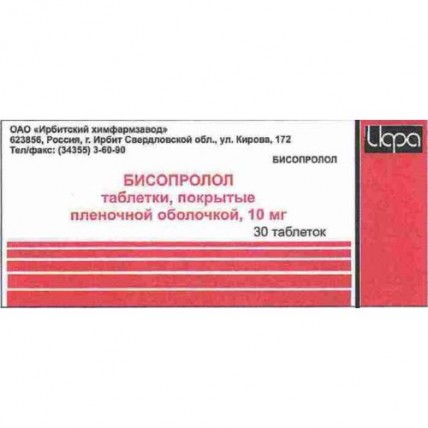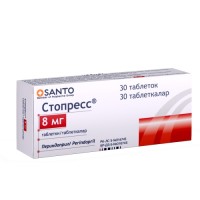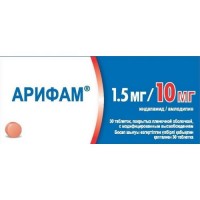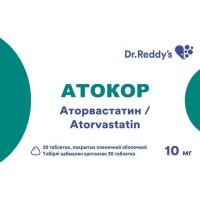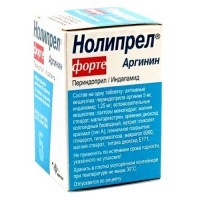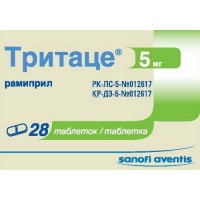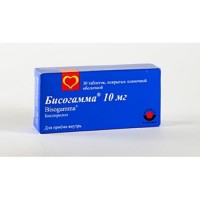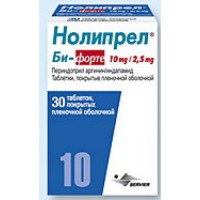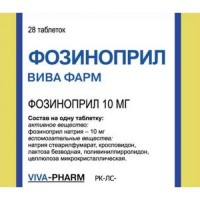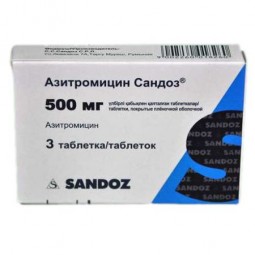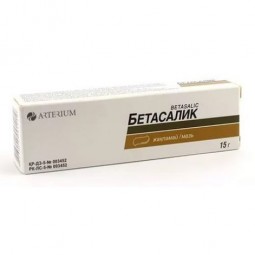Bisoprolol 30s 10 mg film-coated tablets
- $2.80
The instruction for medical use of BISOPROLOL medicine the Trade name Bisoprolol Mezhdunarodnoye the unlicensed name Bisoprolol Lekarstvennaya the Tablet form, film coated, 5 mg and 10 mg One tablet contains Structure: active agent: the bisoprolola fumarates (in terms of 100% substance) 5 mg or 10 mg, excipients (kernel): microcrystalline cellulose, lactoses monohydrate, starch corn, magnesium stearate, krospovidon, silicon dioxide colloidal anhydrous, structure of a cover: gipromelloza, macrogoal 4000, titan E171 dioxide, talc. Description of the Tablet of 5 mg: round, biconvex, film coated white or almost white color. On cross section two layers – a kernel of almost white color and a film cover are visible. Tablets of 10 mg: round, biconvex, film coated white or almost white color. On cross section two layers – a kernel of almost white color and a film cover are visible. Pharmacotherapeutic group Beta blockers. Selection beta blockers. Bisoprolol. ATH code: C07AB07 the Pharmacological Bisoprolol Pharmacokinetics properties almost completely (more than 90%) is soaked up in digestive tract. The effect of primary passing through a liver is insignificant (at the level of 10-15%) that results in high bioavailability (90%). Meal does not affect bioavailability of a bisoprolol. Bisoprolol is metabolized on an oxidizing way without the subsequent conjugation. All metabolites have strong polarity and are removed by kidneys. The main metabolites found in blood plasma and urine do not show pharmacological activity. The data obtained as a result of experiments with microsomes of a liver of the person of in vitro show what bisoprolol is metabolized first of all by means of CYP3A4 isoenzyme (about 95%), and the isoenzyme of CYP2D6 is only of little importance. Communication with proteins of blood plasma about 30%. Distribution volume – 3.5 l/kg. The general clearance – about 15 l/h. The maximum concentration in blood plasma is defined in 2-3 hours. Permeability through a blood-brain barrier and a placental barrier – low. Plasma elimination half-life of blood (10-12 hours) provides efficiency during 24 h after reception of a single daily dose. Bisoprolol is brought from an organism in two ways, 50% of a dose are metabolized in a liver with formation of inactive metabolites. About 98% are removed by kidneys, less than 2% are brought out of them 50% in not changed look, – through intestines (with bile). As removal takes place in kidneys and in a liver equally, with an abnormal liver function or with a renal failure of dose adjustment it is not required to patients. The pharmacokinetics of a bisoprolol is linear and does not depend on age. At patients with the chronic heart failure (CHF) the plasma concentration of a bisoprolol are higher, and elimination half-life is more long in comparison with healthy volunteers. There is no information on pharmacokinetics of a bisoprolol at patients with HSN and a simultaneous abnormal liver function or kidneys. The pharmacodynamics Bisoprolol – selection beta1-adrenoblocker, without own sympathomimetic activity, does not possess membrane stabilizing action. Bisoprolol reduces activity of renin in blood plasma, reduces the need of a myocardium for oxygen, urezhat the heart rate (HR). Has antihypertensive, antiarrhytmic and anti-anginal effect. Blocking heart beta1-adrenoceptors in low doses, reduces stimulated catecholamines formation of cyclic adenosinemonophosphate (tsAMF) from adenosine triphosphate (ATP), reduces intracellular current of calcium ions, oppresses all functions of heart, reduces atrioventricular (AV) conductivity and excitability. When exceeding a therapeutic dose has beta2-adrenoceptor blocking effect. The general peripheric vascular resistance at the beginning of drug use, in the first 24 h, increases (as a result of reciprocal increase of activity of alpha adrenoceptors and elimination of stimulation of beta2-adrenoceptors), in 1-3 days returns to a reference value, and at prolonged use – decreases. The antihypertensive effect is connected with reduction of minute volume of blood, sympathetic stimulation of peripheral vessels, decrease of the activity of sympathoadrenal system (SAS) (is of great importance for patients with initial hypersecretion of renin), recovery of sensitivity in response to a lowering of arterial pressure (ABP) and influence on the central nervous system. In arterial hypertension the effect develops in 2-5 days, stable action is noted in 1-2 months. The anti-anginal effect is caused by reduction of need of a myocardium for oxygen as a result of decrease in contractility and other functions of a myocardium, lengthening of a diastole, improvement of perfusion of a myocardium. Due to increase in end diastolic pressure in a left ventricle and increases in stretching of muscle fibers of ventricles oxygen requirement, especially at patients with HSN can increase. At use in average therapeutic doses, unlike non-selective beta blockers, has less significant impact on the bodies containing beta2-adrenoceptors (pancreas, skeletal muscles, smooth muscles of peripheral arteries, bronchial tubes and a uterus) and on carbohydrate metabolism, does not cause a delay of ions of sodium in an organism, the expressiveness of atherogenous action does not differ from effect of propranolol. Indications arterial hypertension coronary heart disease (stenocardia) the Route of administration and doses take the Drug Bisoprolol inside, in the morning on an empty stomach, once, without chewing, washing down with a small amount of liquid. Tablets should not be chewed or pounded in powder. Treatment of arterial hypertension and stenocardia In all cases the mode of reception and a dosage is selected by the doctor to each patient individually, in particular, considering the heart rate and the therapeutic answer. In arterial hypertension and coronary heart disease usually initial dose of 5 mg of 1 times a day. If necessary the dose is increased to 10 mg of 1 times a day. At treatment of arterial hypertension and stenocardia the maximum daily dose makes 20 mg of 1 times/days. Division of a daily dose into 2 receptions is possible. Special groups of patients Patients with disturbances of functions of kidneys or a liver: - At disturbance of functions of a liver or kidneys of easy or moderate degree usually it is not required to adjust a dose. - In the profound renal failures (KK less than 20 ml/min.) and at patients with a serious illness of a liver the maximum daily dose makes 10 mg. Increase in a dose at such patients has to be carried out with extra care. There is only a limited experience of use of Bisoprolol at dialysis patients which does not indicate the need to correction of the mode of dosing. Elderly patients of Dose adjustment it is not required. Children As are not present enough data on use of the drug Bisoprolol for children, it is not recommended to appoint drug to children up to 18 years. Side effect the Frequency of the side reactions given below was defined according to the following (classification of World Health Organization): very often – not less than 10%, are frequent – not less than 1%, but less than 10%, infrequently – not less than 0.1%, but less than 1%, is rare – not less than 0.01%, but less than 0.1%, is very rare – less than 0.01%, including separate messages. Very often: - urezheny ChSS (bradycardia, especially at patients with HSN), the heart consciousness Is frequent: - the significant decrease in the ABP (especially at patients with HSN) - manifestation of a vasomotor spasm (strengthening of disturbances of peripheric circulation, cryesthesia or numbness in extremities (paresthesia)) - dizziness *, a headache * - sleep disorders - a depression, concern - nausea, vomiting, diarrhea, a constipation - dryness of a mucous membrane of an oral cavity - an abdominal pain - an asthenia - increased fatigue * Infrequently: - disturbance of atrioventricular conductivity (up ment of a total cross block and cardiac arrest), deterioration in the available heart failure with development of peripheral hypostases (puffiness of anklebones, feet, an asthma) - a stethalgia - arrhythmias - orthostatic hypotension - a bronchospasm at patients with bronchial asthma or with an obstructive disease of respiratory organs in the anamnesis - hypotonia - an arthralgia - a dorsodynia Seldom: - increase in level of triglycerides, increase in level of liver enzymes (alaninaminotranspherase (ALT), aspartate aminotransferase (nuclear heating plant)), increase in concentration of bilirubin - a syncope - reduction of a slezootdeleniye (it is necessary to consider when carrying contact lenses by the patient) - a disorder of vision - a hearing disorder, sonitus, ear pain - allergic rhinitis, congestion of a nose - reaction of hypersensitivity, such as itching, reddening, rash - the increased sweating - a dermahemia - a dieback - psoriazopodobny skin reactions - hepatitis - confusion of consciousness or short-term loss of memory - a myasthenia - a tremor - myotonia - nightmares, hallucinations Is very rare: - conjunctivitis, dryness and morbidity of eyes - disturbance of taste - disturbance of potency, weakening of a libido - a hair loss. Beta blockers can aggravate psoriasis. In some cases: - thrombocytopenia, agranulocytosis, leukopenia. * These symptoms arise more often in an initiation of treatment. They, as a rule, have low-intensive character and usually disappear within 1-2 weeks. Contraindications hypersensitivity to a bisoprolol, components of drug and to other beta blockers the acute heart failure or heart failure in a decompensation stage demanding performing inotropic therapy cardiogenic shock sinuatrial blockade a fluid lungs atrioventricular block (AV) blockade of the II-III degree without electrocardiostimulator symptomatic hypotension a sick sinus syndrome symptomatic bradycardia (ChSS less than 50 ud. / min.) severe forms of bronchial asthma and the chronic obstructive pulmonary disease (COPD) in the anamnesis late stages of a peripheral arterial occlusive disease, Reynaud's syndrome a metabolic acidosis a pheochromocytoma (without simultaneous use of alpha adrenoblockers) children's age up to 18 years (the efficiency and safety are not established) pregnancy and the period of a lactation With care - a hypertension or stenocardia with the accompanying heart failure - performing the desensibilizing therapy - Printsmetal's stenocardia - diabetes of 1 type and diabetes with considerable fluctuations of concentration of glucose in blood, hypoglycemia symptoms (for example, tachycardia, a cardiopalmus or perspiration), which can be disguised - AV blockade of the I degree - to patients who in the anamnesis have a psoriasis, beta-blockers have to be appointed only after careful assessment of advantage/risk - a rigid diet - a peripheral arterial occlusive disease (complaints, especially at the beginning of therapy can increase). Medicinal interactions the Antiarrhytmic means of the I class which are not recommended to a combination (for example, quinidine, Disopyramidum, lidocaine, Phenytoinum, flekainid, propafenon) at simultaneous use with bisoprololy can reduce AV conductivity and sokratitelny ability of heart. The Blockers of Slow Calcium Channels (BSCC) of type of verapamil and to a lesser extent, diltiazem, at simultaneous use with bisoprololy can lead to decrease in sokratitelny ability of a myocardium and disturbance of AV of conductivity. In particular, intravenous administration of verapamil to the patients accepting beta blockers can lead to the profound arterial hypotension and AV to blockade. Antihypertensives of the central action (such as clonidine, Methyldopum, moksonidin, rilmenidin) can lead to an urezheniye of ChSS and decrease in warm emission and also to a vazodilatation owing to decrease in the central sympathetic tone. Sharp cancellation, especially before cancellation of beta blockers can increase risk of developing ricochet arterial hypertension. The combinations demanding care Antiarrhytmic means of the III class (for example, Amiodaronum) can strengthen action of a bisoprolol on AV conductivity. Effect of beta blockers for topical administration (for example, eye drops for treatment of glaucoma) can enhance system effects of a bisoprolol (decrease in the ABP, urezheny ChSS). Parasimpatomimetiky at simultaneous use with bisoprololy can strengthen disturbance of AV of conductivity and increase risk of developing bradycardia. Simultaneous use of the drug Bisoprolol with beta-adrenergic agonists (for example, izoprenalin, Dobutaminum) can lead to decrease in effect of both drugs. The combination of a bisoprolol to the adrenomimetika influencing beta and alpha adrenoceptors (for example, Norepinephrinum, epinephrine), can enhance vasopressor effects of these means arising with participation of alpha adrenoceptors, leading to increase in the ABP. Similar interactions are more probable at use of non-selective beta blockers. Meflokhin at simultaneous use with bisoprololy can increase risk of developing bradycardia. The allergens used for an immunotherapy or extracts of allergens for skin tests increase risk of emergence of heavy system allergic reactions or an anaphylaxis at the patients receiving bisoprolol. Yodosoderzhashchy X-ray contrast diagnostic intravenous agents increase risk of development of anaphylactic reactions. Phenytoinum at intravenous administration, means for inhalation anesthesia (derivatives of hydrocarbons) increase expressiveness of cardiodepressive action and probability of decrease in the ABP. The efficiency of insulin or hypoglycemic means for intake can change at treatment bisoprololy (masks symptoms of the developing hypoglycemia: tachycardia, increase in the ABP). The clearance of lidocaine and xanthines (except theophylline) can decrease in connection with possible increase in their concentration in blood plasma, especially at patients with initially increased clearance of theophylline under the influence of smoking. Antihypertensive effect non-steroidal anti-inflammatory drugs (NPVP) (a delay of ions of sodium and blockade of synthesis of prostaglandins kidneys) weaken, glucocorticosteroids and estrogen (delay of ions of sodium). Cardiac glycosides, Methyldopum, reserpine and guanfatsin, blockers of slow calcium channels (verapamil, diltiazem), Amiodaronum and other antiarrhytmic means increase risk of development or aggravation of bradycardia, AV of blockade, cardiac arrest and heart failure. Nifedipine can lead to considerable decrease in the ABP. Diuretics, a clonidine, sympatholytics, gidralazin and other antihypertensives can lead to excessive decrease in the ABP. Action of not depolarizing muscle relaxants and anticoagulating effect of coumarins during treatment bisoprololy can be extended. Tricyclic and tetracyclic antidepressants, antipsychotic means (neuroleptics), ethanol, sedative and sleeping medicines strengthen oppression of the central nervous system. Simultaneous use with MAO inhibitors (except for MAO-B inhibitors) owing to considerable strengthening of antihypertensive action is not recommended. Simultaneous use can also lead ment of hypertensive crisis. Having rummaged in treatment between intake of MAO inhibitors and a bisoprolola has to make not less than 14 days. Not hydrogenated alkaloids of an ergot increase risk of development of disturbances of peripheric circulation. Ergotamine increases risk of development of disturbance of peripheric circulation. Sulfasalazinum increases concentration of a bisoprolol in blood plasma. Rifampicin shortens elimination half-life of a bisoprolol. Special instructions Control of a condition of the patients taking the drug Bisoprolol has to include measurement of ChSS and the ABP, carrying out the ECG, definition of concentration of glucose of blood at patients with diabetes (1 time in 4-5 months). At patients of advanced age it is recommended to monitor function of kidneys (1 time in 4-5 months). It is necessary to train the patient in a technique of calculation of ChSS and to instruct about need of medical consultation at ChSS less than 50 beats/min. Before an initiation of treatment it is recommended to conduct a research of function of external respiration at patients with the burdened bronchopulmonary anamnesis. The patients using contact lenses should consider that against the background of drug treatment the reduction of products of a plaintive
dkost is possible. At use of the drug Bisoprolol for patients with a pheochromocytoma there is a risk of developing paradoxical arterial hypertension (if effective blockade of alpha adrenoceptors is previously not reached). In a thyrotoxicosis bisoprolol can mask certain clinical signs of a thyrotoxicosis (for example, tachycardia). Sharp drug withdrawal at patients with a thyrotoxicosis is contraindicated as it is capable to strengthen symptomatology. In diabetes bisoprolol can mask the tachycardia caused by a hypoglycemia. Unlike non-selective beta blockers practically does not strengthen the hypoglycemia caused by insulin and does not delay restoration of concentration of glucose in blood to normal value. In need of cancellation of a clonidine, in case of joint reception with bisoprololy, administration of drug can be stopped only in several days after Bisoprolol's cancellation. Strengthening of expressiveness of hypersensitivity reaction and lack of effect of usual doses of epinephrine (adrenaline) against the background of the burdened allergological anamnesis is possible. In case of need performing planned surgical treatment Bisoprolol should be cancelled for 48 h before carrying out the general anesthesia. If the patient took the drug before surgical intervention, it should pick up medicine for the general anesthesia with minimum negative inotropic effect. Reciprocal activation of vagus nerve can be eliminated with intravenous administration of atropine (1-2 mg). Medicines which exhaust depot of catecholamines (including reserpine) can strengthen effect of beta blockers therefore the patients accepting such combinations of medicines have to be under constant observation of the doctor regarding identification of the significant decrease in the ABP or bradycardia. Patients with bronkhospastichesky diseases can appoint with care cardioselective beta blockers in case of intolerance and/or inefficiency of other antihypertensives. Against the background of intake of beta blockers at patients with the accompanying bronchial asthma resistance of airways can amplify. When exceeding a dose of the drug Bisoprolol such patients have a danger of development of a bronchospasm. In case of identification at patients of the accruing bradycardia (ChSS less than 50 ud. / min.), significant decrease in the ABP (systolic arterial blood pressure less than 100 mm Hg.), blockade AV, it is necessary to reduce a dose or to stop treatment. It is recommended to stop therapy by the drug Bisoprolol at development of a depression. It is impossible to interrupt sharply treatment because of danger of development of heavy arrhythmias and a myocardial infarction. Drug withdrawal is carried out gradually, reducing a dose within 2 weeks and more (lower a dose by 25% in 3-4 days). It is necessary to cancel drug before a concentration research in blood and urine of catecholamines, a normetanefrina, vanilinmindalny acid, credits of antinuclear antibodies. At smokers the efficiency of beta blockers is lower. So far there are not enough data on use of the drug Bisoprolol for patients from HSN interfaced to diabetes of 1 type, the profound renal failures and/or a liver, a restrictive cardiomyopathy, congenital heart diseases or valvular heart disease with the significant hemodynamic disturbances. Also still sufficient data concerning patients with HSN with a myocardial infarction within the last 3 months were not obtained. Use at pregnancy and in the period of a lactation Bisoprolol has pharmacological effects which can make harmful effects on a course of pregnancy and/or on a fruit or the newborn. Usually beta blockers reduce placentary perfusion that leads to delay of growth of a fruit, pre-natal death of a fruit, abortions or premature births. The fruit and the newborn child can have pathological reactions (for example, a hypoglycemia, bradycardia, arterial hypotension). Bisoprolol it is not necessary to apply at pregnancy, use is possible in case the advantage for mother exceeds risk of development of side effects at a fruit and/or the child. When treatment by Bisoprolol is considered as necessary, it is necessary to make observation of an uteroplacental blood-groove and pre-natal fetation. In case of negative impact on pregnancy or a fruit it is necessary to consider alternative therapy. Symptoms of a hypoglycemia and bradycardia, as a rule, arise during the first 3 days. It is necessary to examine carefully the newborn after the delivery. Data on discharge of a bisoprolol in breast milk are absent. Therefore in need of use of drug in the period of a lactation, breastfeeding needs to be stopped. Influence on ability to run vehicles and to work with the equipment demanding the increased concentration of attention Use of the drug Bisoprolol does not affect ability to run vehicles according to results of a research at patients with an ischemic heart disease. However owing to individual reactions the ability to run vehicles or work with technically difficult mechanisms can be broken. On it it is necessary to pay special attention in an initiation of treatment, after change of a dose and also at simultaneous alcohol intake. Overdose Symptoms: arrhythmia, ventricular premature ventricular contraction, profound bradycardia, AV blockade, significant decrease in the ABP, acute heart failure, hypoglycemia, Crocq's disease, breath difficulty, bronchospasm, dizziness, faint, spasms. Treatment: at overdose emergence, first of all it is necessary to suspend administration of drug, to carry out gastric lavage, to appoint the adsorbing means, to carry out symptomatic therapy. In the profound bradycardia - intravenous administration of atropine. If effect insufficient, with care it is possible to enter the means possessing positive chronotropic action. Temporary setting of an artificial pacemaker can sometimes be required. At the significant decrease in the ABP - intravenous administration of plasma substituting solutions and vazopressor. At a hypoglycemia the intravenous administration of a dextrose (glucose) can be shown. At AV to blockade: patients have to be under constant observation and receive treatment by beta-adrenergic agonists, such as epinephrine. In case of need – setting of an artificial pacemaker. At aggravation of a course of HSN – intravenous administration of diuretics, drugs with positive inotropic effects and also vazodilatator. At a bronchospasm – prescribing of bronchodilators, including beta2-adrenomimetik and/or Aminophyllinum. A form of release and packing On 10 tablets in blister strip packaging. On 30 tablets in bank from polymeric materials. 3 blister strip packagings or to bank from polymeric materials with the instruction for medical use place in a pack from cardboard. To Store storage conditions in the dry, protected from light place at a temperature not over 25 ºС. To store out of children's reach! 2 years not to use a period of storage after expiry date. Prescription status According to the prescription JSC Irbit Chemical Pharmaceutical Plant Producer 623856, Russia, Sverdlovsk Region, Irbit, Karl Marx St., a 124-a the Owner of the registration certificate of JSC Irbit Chemical Pharmaceutical Plant, Russia the Name, the address and a contact information (phone, the fax, e-mail) of the organization in the territory of the Republic of Kazakhstan, the accepting claim (offer) on quality of medicines from consumers: SP Utegenova B. A. 010000, Kazakhstan, Astana, Ramazan St., 33, apartment 9
dkost is possible. At use of the drug Bisoprolol for patients with a pheochromocytoma there is a risk of developing paradoxical arterial hypertension (if effective blockade of alpha adrenoceptors is previously not reached). In a thyrotoxicosis bisoprolol can mask certain clinical signs of a thyrotoxicosis (for example, tachycardia). Sharp drug withdrawal at patients with a thyrotoxicosis is contraindicated as it is capable to strengthen symptomatology. In diabetes bisoprolol can mask the tachycardia caused by a hypoglycemia. Unlike non-selective beta blockers practically does not strengthen the hypoglycemia caused by insulin and does not delay restoration of concentration of glucose in blood to normal value. In need of cancellation of a clonidine, in case of joint reception with bisoprololy, administration of drug can be stopped only in several days after Bisoprolol's cancellation. Strengthening of expressiveness of hypersensitivity reaction and lack of effect of usual doses of epinephrine (adrenaline) against the background of the burdened allergological anamnesis is possible. In case of need performing planned surgical treatment Bisoprolol should be cancelled for 48 h before carrying out the general anesthesia. If the patient took the drug before surgical intervention, it should pick up medicine for the general anesthesia with minimum negative inotropic effect. Reciprocal activation of vagus nerve can be eliminated with intravenous administration of atropine (1-2 mg). Medicines which exhaust depot of catecholamines (including reserpine) can strengthen effect of beta blockers therefore the patients accepting such combinations of medicines have to be under constant observation of the doctor regarding identification of the significant decrease in the ABP or bradycardia. Patients with bronkhospastichesky diseases can appoint with care cardioselective beta blockers in case of intolerance and/or inefficiency of other antihypertensives. Against the background of intake of beta blockers at patients with the accompanying bronchial asthma resistance of airways can amplify. When exceeding a dose of the drug Bisoprolol such patients have a danger of development of a bronchospasm. In case of identification at patients of the accruing bradycardia (ChSS less than 50 ud. / min.), significant decrease in the ABP (systolic arterial blood pressure less than 100 mm Hg.), blockade AV, it is necessary to reduce a dose or to stop treatment. It is recommended to stop therapy by the drug Bisoprolol at development of a depression. It is impossible to interrupt sharply treatment because of danger of development of heavy arrhythmias and a myocardial infarction. Drug withdrawal is carried out gradually, reducing a dose within 2 weeks and more (lower a dose by 25% in 3-4 days). It is necessary to cancel drug before a concentration research in blood and urine of catecholamines, a normetanefrina, vanilinmindalny acid, credits of antinuclear antibodies. At smokers the efficiency of beta blockers is lower. So far there are not enough data on use of the drug Bisoprolol for patients from HSN interfaced to diabetes of 1 type, the profound renal failures and/or a liver, a restrictive cardiomyopathy, congenital heart diseases or valvular heart disease with the significant hemodynamic disturbances. Also still sufficient data concerning patients with HSN with a myocardial infarction within the last 3 months were not obtained. Use at pregnancy and in the period of a lactation Bisoprolol has pharmacological effects which can make harmful effects on a course of pregnancy and/or on a fruit or the newborn. Usually beta blockers reduce placentary perfusion that leads to delay of growth of a fruit, pre-natal death of a fruit, abortions or premature births. The fruit and the newborn child can have pathological reactions (for example, a hypoglycemia, bradycardia, arterial hypotension). Bisoprolol it is not necessary to apply at pregnancy, use is possible in case the advantage for mother exceeds risk of development of side effects at a fruit and/or the child. When treatment by Bisoprolol is considered as necessary, it is necessary to make observation of an uteroplacental blood-groove and pre-natal fetation. In case of negative impact on pregnancy or a fruit it is necessary to consider alternative therapy. Symptoms of a hypoglycemia and bradycardia, as a rule, arise during the first 3 days. It is necessary to examine carefully the newborn after the delivery. Data on discharge of a bisoprolol in breast milk are absent. Therefore in need of use of drug in the period of a lactation, breastfeeding needs to be stopped. Influence on ability to run vehicles and to work with the equipment demanding the increased concentration of attention Use of the drug Bisoprolol does not affect ability to run vehicles according to results of a research at patients with an ischemic heart disease. However owing to individual reactions the ability to run vehicles or work with technically difficult mechanisms can be broken. On it it is necessary to pay special attention in an initiation of treatment, after change of a dose and also at simultaneous alcohol intake. Overdose Symptoms: arrhythmia, ventricular premature ventricular contraction, profound bradycardia, AV blockade, significant decrease in the ABP, acute heart failure, hypoglycemia, Crocq's disease, breath difficulty, bronchospasm, dizziness, faint, spasms. Treatment: at overdose emergence, first of all it is necessary to suspend administration of drug, to carry out gastric lavage, to appoint the adsorbing means, to carry out symptomatic therapy. In the profound bradycardia - intravenous administration of atropine. If effect insufficient, with care it is possible to enter the means possessing positive chronotropic action. Temporary setting of an artificial pacemaker can sometimes be required. At the significant decrease in the ABP - intravenous administration of plasma substituting solutions and vazopressor. At a hypoglycemia the intravenous administration of a dextrose (glucose) can be shown. At AV to blockade: patients have to be under constant observation and receive treatment by beta-adrenergic agonists, such as epinephrine. In case of need – setting of an artificial pacemaker. At aggravation of a course of HSN – intravenous administration of diuretics, drugs with positive inotropic effects and also vazodilatator. At a bronchospasm – prescribing of bronchodilators, including beta2-adrenomimetik and/or Aminophyllinum. A form of release and packing On 10 tablets in blister strip packaging. On 30 tablets in bank from polymeric materials. 3 blister strip packagings or to bank from polymeric materials with the instruction for medical use place in a pack from cardboard. To Store storage conditions in the dry, protected from light place at a temperature not over 25 ºС. To store out of children's reach! 2 years not to use a period of storage after expiry date. Prescription status According to the prescription JSC Irbit Chemical Pharmaceutical Plant Producer 623856, Russia, Sverdlovsk Region, Irbit, Karl Marx St., a 124-a the Owner of the registration certificate of JSC Irbit Chemical Pharmaceutical Plant, Russia the Name, the address and a contact information (phone, the fax, e-mail) of the organization in the territory of the Republic of Kazakhstan, the accepting claim (offer) on quality of medicines from consumers: SP Utegenova B. A. 010000, Kazakhstan, Astana, Ramazan St., 33, apartment 9
